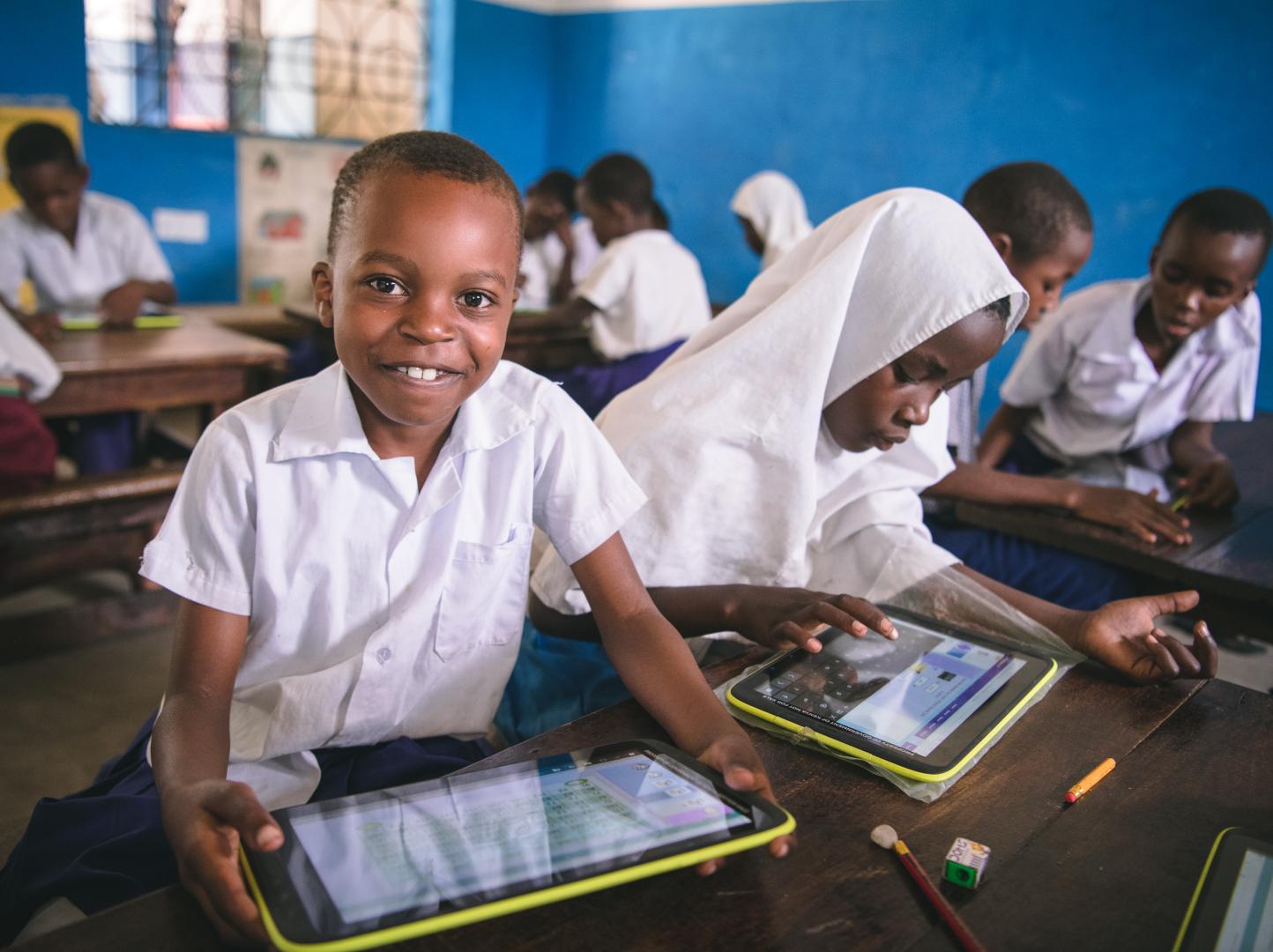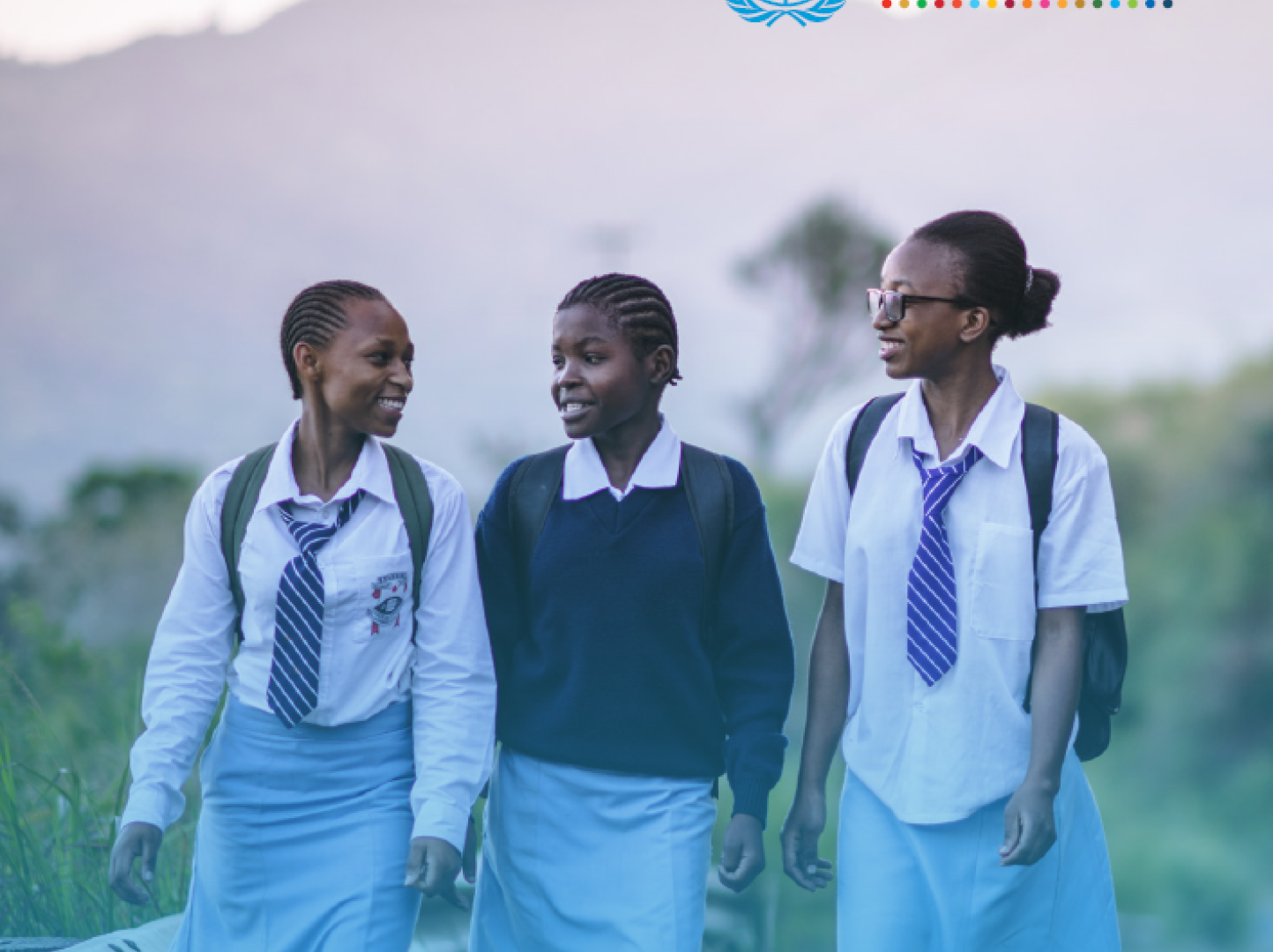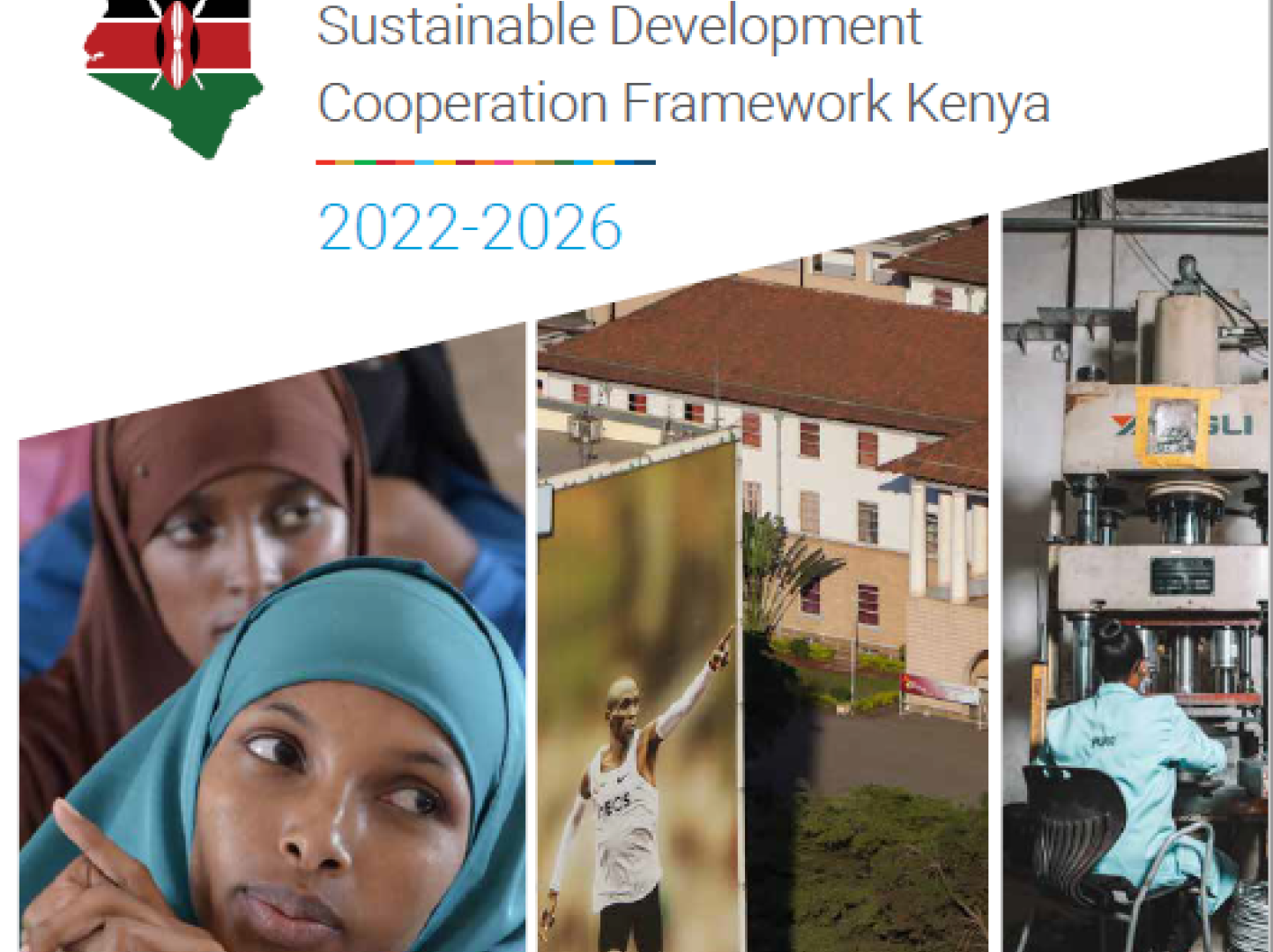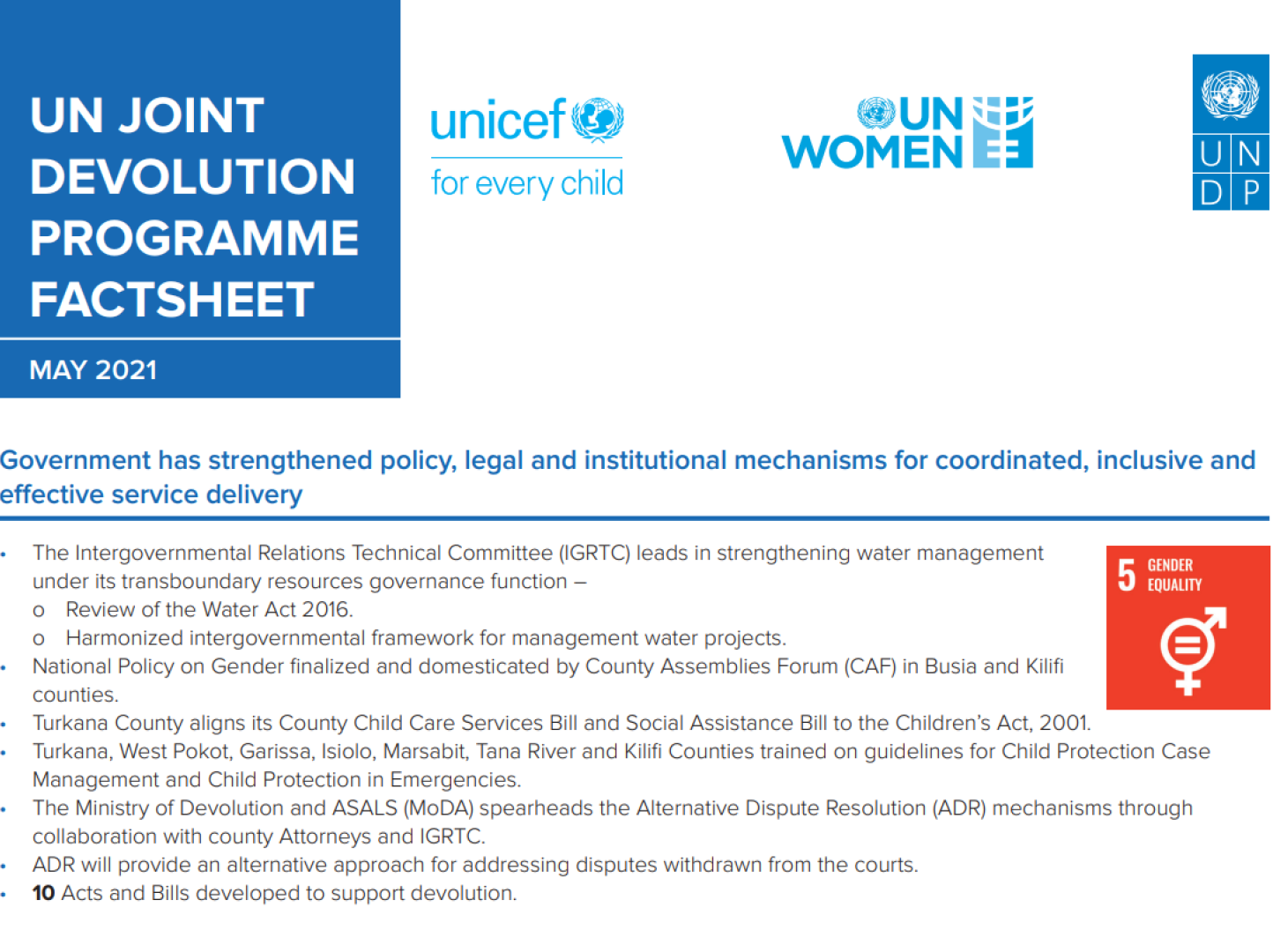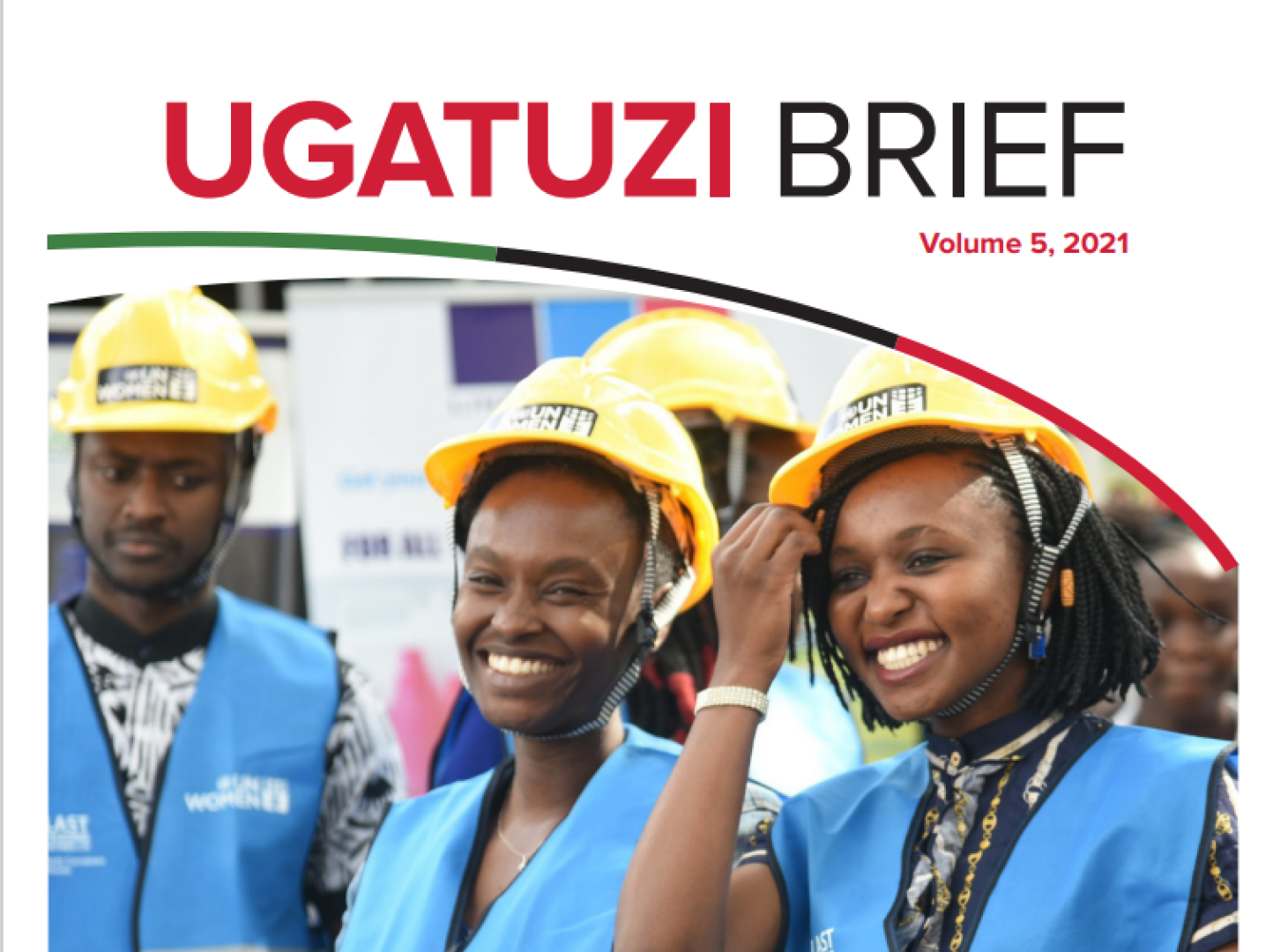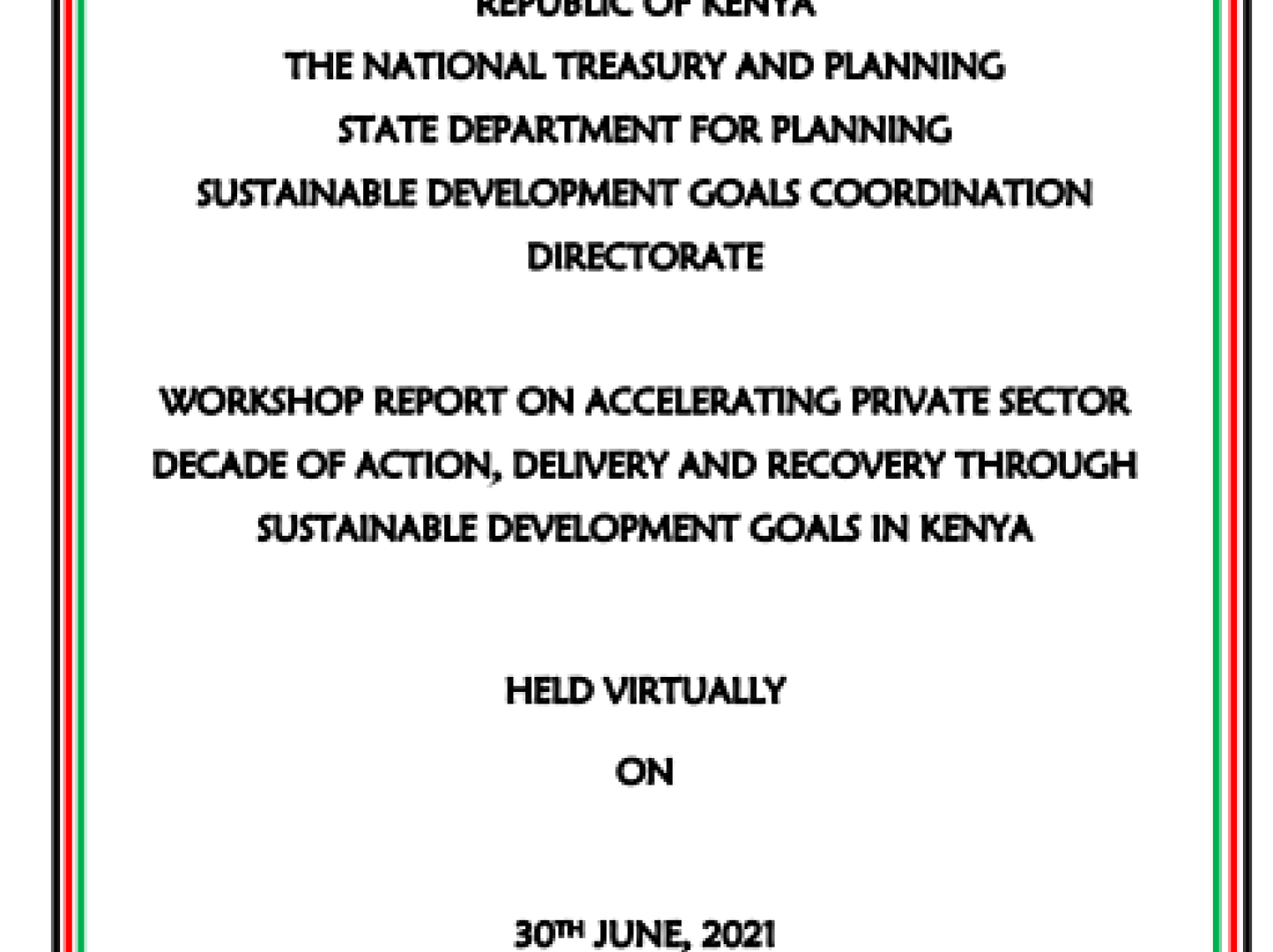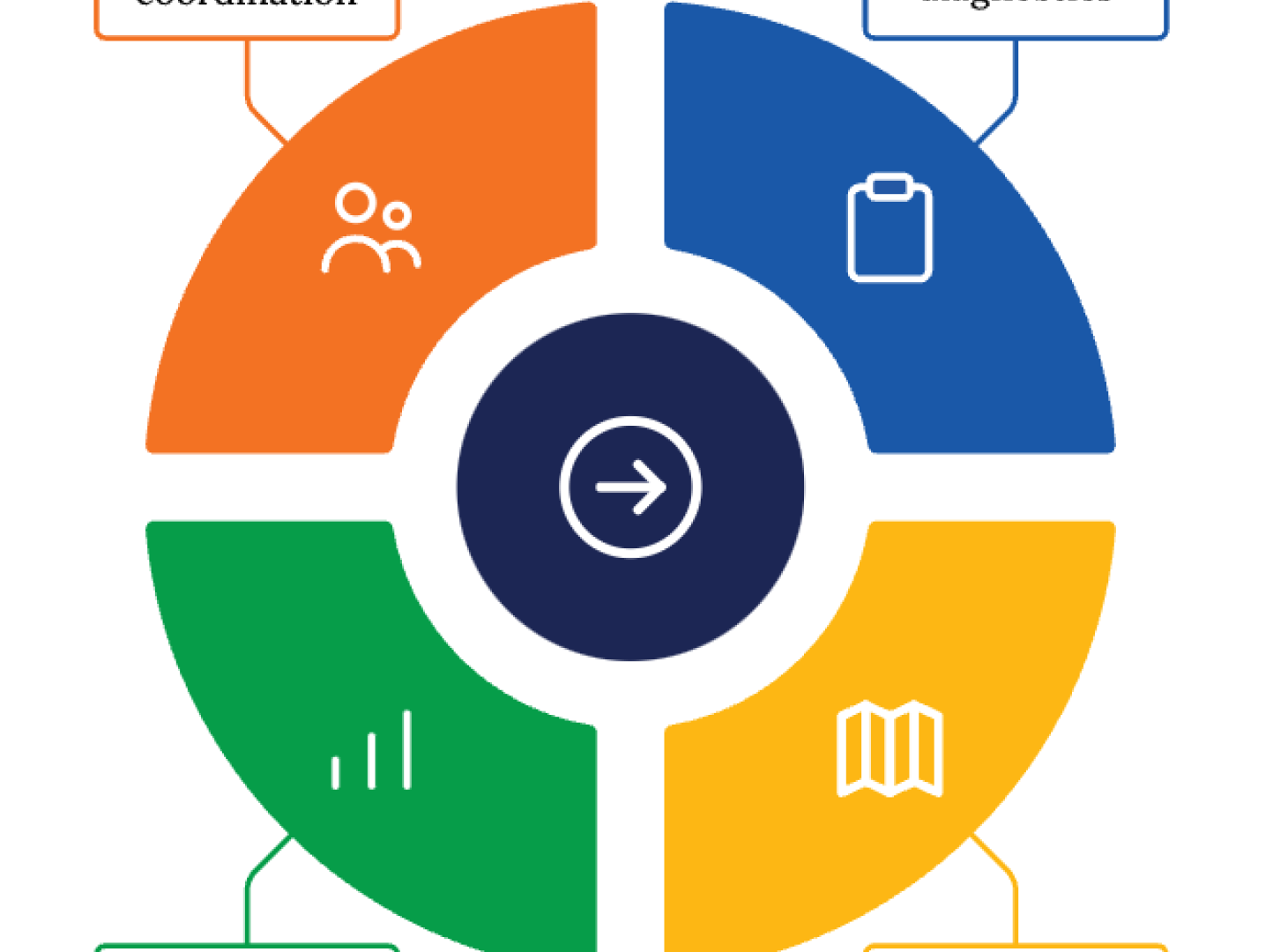Latest
Story
10 December 2025
UNEA-7 commences in Nairobi with Kenya at the Centre of Global Environmental Action
Learn more
Story
26 November 2025
Kenya launches the Race to 2030 with renewed urgency on financing and partnerships
Learn more
Story
25 October 2025
Professor Michael Ndurumo Named 2025 United Nations in Kenya Person of the Year
Learn more
Latest
The Sustainable Development Goals in Kenya
The Sustainable Development Goals are a global call to action to end poverty, protect the earth’s environment and climate, and ensure that people everywhere can enjoy peace and prosperity. These are the goals the UN is working on in Kenya:
Take Action
19 September 2021
Donate to the SDGs - Keeping the Promise
We are putting the power to achieve the SDGs in the hands of everybody around the world who want to create a better future. The United Nations Joint SDG Fund is the world’s first and only investment vehicle to enable SDG financing to “building forward better.”
1 of 3
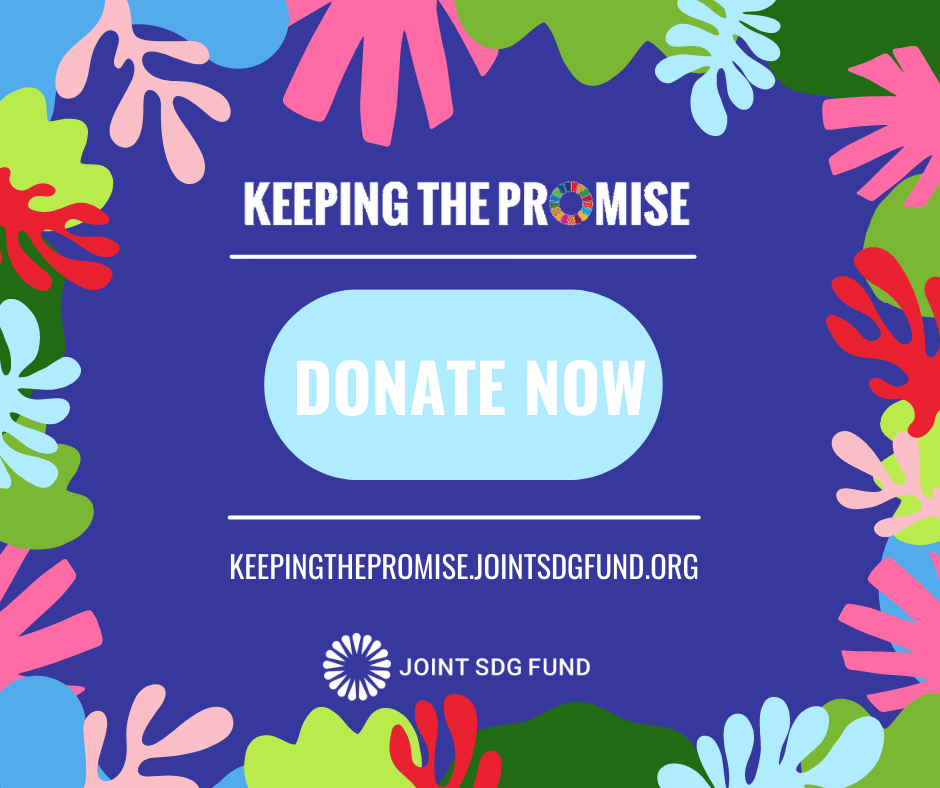
Take Action
18 September 2021
Donate to the SDGs
The United Nations Joint SDG Fund is the world’s first and only investment vehicle to enable SDG financing across the entire UN system committed to “building forward better.”
1 of 3
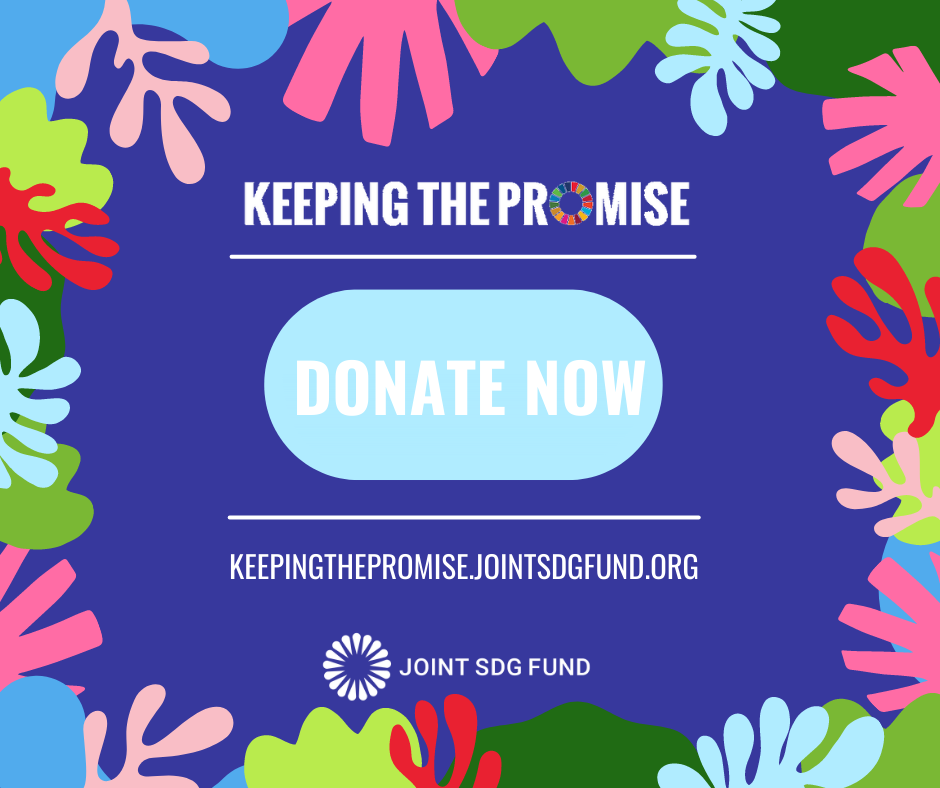
Story
01 February 2021
UNDP Kenya and Ministry of Health Launch Smart Robots to Prevent the Spread COVID-19
The United Nations Development Programme (UNDP) in collaboration with Ministry of Health has launched the piloting of smart anti-epidemic robotic solutions to aid the health response and management of the COVID-19 pandemic in Kenya. As the world contends with the impact of COVID-19 – a highly infectious virus – frontline healthcare workers remain highly vulnerable due to exposure to the virus's transmission. The deployment of the smart anti-epidemic robotic solutions, funded by the Government of Japan, will play an essential role in protecting frontline healthcare workers by limiting direct human-contact with patients. The robots will further support preventive measures and enhance public awareness of COVID-19 preventive measures and generate real-time statistics reports.
Speaking at the launch event, the Cabinet Secretary Ministry of Health Hon. Mutahi Kagwe noted that: Digitization is one of the strategies used to combat the pandemic which has proven highly infectious. With this realization, the Government is partnering with UNDP and the Government of Japan, to utilise technology in the COVID-19 health response. The Robotic technology to be deployed at Kenyatta National Hospital and Jomo Kenyatta International Airport will go further in assisting our healthcare in managing the disease."
Compelling evidence has shown that the use of technology can accelerate the development of COVID-19 diagnostics, therapeutics and vaccines. Digital innovations can also strengthen the health and community systems needed to deliver diagnostics, therapeutics and vaccines to people in need. The integration of the robots into Kenya’s healthcare system, will enhance the control of infections, prevent transmissions and support the storage of big data to inform decision making, and preparedness, ultimately contributing to the flattening of the infection curve.
“The piloting of the smart anti-epidemic robotic solutions is by no means a replacement of the crucial role played by our healthcare workers. Based on lessons from global and regional experiences where UNDP has successfully supported similar initiatives (Rwanda, Equatorial Guinea and India) we hope the introduction of the robotics in Kenya will uncover insights on leveraging technology within the healthcare system. Through an experimental lens, as a long-term investment, we hope to test the impact and effectiveness of robotics in the healthcare and a potential scaled up adoption of similar technologies across more public health facilities. We are keen to leverage this technology to provide an opportunity for the youth in Kenya to gain 4IR skills and hopefully open more employment and entrepreneurship opportunities” said Walid Badawi, Resident Representative, UNDP Kenya.
The robotic solutions designed in Belgium and distributed by Zorabots Africa was procured as part of UNDP’s broader support that aims to strengthen Kenya’s COVID-19 response at national and county levels, through an inclusive and multisectoral approach which includes addressing its Socio-Economic Impact. The Government of Japan has provided UNDP in Kenya with funding worth USD 2 million as part of UNDP’s global support to COVID 19 Response, which Kenya is among 60 beneficiary countries.
“Improvement healthcare is one of Kenya's policy priorities. And so, the support to this sector with such advanced technology as we are handing over today will no doubt contribute to the great effort currently underway to control COVID-19 in Kenya successfully. I can assure you that Japan will continue to collaborate with Kenya not only in the Health Sector but also in various fields to support the BIG-4 Agenda and thus maintaining our good relationship.” H.E. Ryoichi Horie, Japan Ambassador to Kenya.
Besides the smart anti-epidemic robotic solutions, valued at USD 320,000; UNDP also handed over 2 Medical waste microwaves valued at USD 400,000 for Migori and Siaya Counties - these have already been delivered to the hospitals and are currently being installed; PPEs valued at over USD 200,000 to complement further our contribution to partner institutions for the continuity of business in the national response; and, Testing kits valued at over USD 230,000.
###
Notes for the editors:
In line with the Secretary-General's mandate for UNDP, as the technical lead on socio-economic response and recovery, UNDP is working closely with the U.N. Resident Coordinator and the U.N. Country Team in Kenya to respond to the Government's requests for socio-economic assessments, support and implementation of the national COVID-19 response and recovery plans. UNDP has put its assets at the disposal of the U.N. system to facilitate a response that builds on the expertise of the entirety of the U.N. System, and provides the integrated policy advice and implementation support required in a development emergency setting. So far, UNDP in Kenya has mobilized over USD 7 million in support of COVID-19 response efforts. The funds have been used to support, among others: Technical leadership support in the drafting and implementation of the UN COVID-19 Socio-economic Response Plan, technical and financial support towards the Government of Kenya national Economic Recovery Strategy led by National Treasury and Planning and the County COVID-19 Social-Economic Reengineering and Recovery Strategy led by the Council of Governors The deployment of 50 U.N. Volunteer frontline health workers to increase response capacity in 14 counties placed in hospitals and medical facilities to counties most in need under our U.N. Joint Devolution Programme implemented in collaboration with our sister agencies UNWOMEN and UNICEF - in partnership with the Ministry of Devolution and ASALs; Procurement of personal protective equipment (PPEs) in support of various government institutions to support business continuity including MoH, EACC, Council of Governors, Ministry of Environment and Forestry amongst others with a focus on buying Kenya and build Kenya also to foster local economic revitalization; Provision of medical waste disposal equipment to facilitate safe management of waste in 13 health facilities across the four counties we are working with under our Global Environment Facility (GEF) support programme in collaboration with the Ministry of Environment and Forestry Raising awareness, factual information and communication on COVID-19 – including addressing gender-based violence and access to justice through our partnership and collaboration with civil society organizations, the County Assemblies Forum, and County Governments Surfacing and supporting innovations from brilliant Kenyan youth that with the right support can hold the keys to doing development differently and building forward better through the Great COVID Innovation Challenge.
In line with the Secretary-General's mandate for UNDP, as the technical lead on socio-economic response and recovery, UNDP is working closely with the U.N. Resident Coordinator and the U.N. Country Team in Kenya to respond to the Government's requests for socio-economic assessments, support and implementation of the national COVID-19 response and recovery plans. UNDP has put its assets at the disposal of the U.N. system to facilitate a response that builds on the expertise of the entirety of the U.N. System, and provides the integrated policy advice and implementation support required in a development emergency setting. So far, UNDP in Kenya has mobilized over USD 7 million in support of COVID-19 response efforts. The funds have been used to support, among others: Technical leadership support in the drafting and implementation of the UN COVID-19 Socio-economic Response Plan, technical and financial support towards the Government of Kenya national Economic Recovery Strategy led by National Treasury and Planning and the County COVID-19 Social-Economic Reengineering and Recovery Strategy led by the Council of Governors The deployment of 50 U.N. Volunteer frontline health workers to increase response capacity in 14 counties placed in hospitals and medical facilities to counties most in need under our U.N. Joint Devolution Programme implemented in collaboration with our sister agencies UNWOMEN and UNICEF - in partnership with the Ministry of Devolution and ASALs; Procurement of personal protective equipment (PPEs) in support of various government institutions to support business continuity including MoH, EACC, Council of Governors, Ministry of Environment and Forestry amongst others with a focus on buying Kenya and build Kenya also to foster local economic revitalization; Provision of medical waste disposal equipment to facilitate safe management of waste in 13 health facilities across the four counties we are working with under our Global Environment Facility (GEF) support programme in collaboration with the Ministry of Environment and Forestry Raising awareness, factual information and communication on COVID-19 – including addressing gender-based violence and access to justice through our partnership and collaboration with civil society organizations, the County Assemblies Forum, and County Governments Surfacing and supporting innovations from brilliant Kenyan youth that with the right support can hold the keys to doing development differently and building forward better through the Great COVID Innovation Challenge.
1 of 3
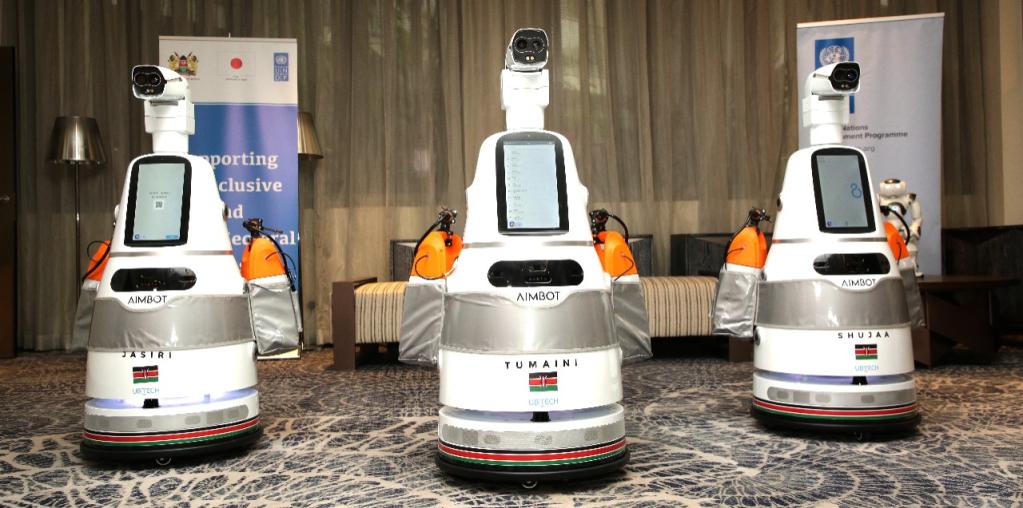
Story
10 December 2025
UNEA-7 commences in Nairobi with Kenya at the Centre of Global Environmental Action
The seventh session of the United Nations Environment Assembly (UNEA-7) commenced in Nairobi after a week of intensive negotiations, high-level dialogues, youth engagement and renewed calls for decisive global action. Nearly 6,000 delegates from more than 170 countries are meeting at the United Nations Environment Programme (UNEP) headquarters from 8 to 12 December to deliberate on the theme “Advancing Sustainable Solutions for a Resilient Planet.”The Assembly convenes at a moment shaped by accelerating climate shocks, pollution burdens, biodiversity decline and the widening gap between scientific warnings and the global response. Delegates are examining a broad range of resolutions on artificial intelligence, chemical and waste governance, sustainable management of minerals and metals, transboundary freshwater cooperation, circular economy pathways, wildfire management, ocean governance, migratory species and climate justice.In her opening message, UN Deputy Secretary-General Amina Mohammed urged countries to act decisively to safeguard ecosystems and the stability of communities worldwide. UNEA-7 President Abdullah Bin Ali Al-Amri echoed this appeal throughout the week, emphasising the need for science-driven consensus, trust and fairness. “Our success depends not only on what we adopt but on how we reach it,” he reminded delegates.
Nairobi’s Role and Kenya’s LeadershipHosting UNEA-7 reaffirmed Nairobi’s long-standing position as the world’s environmental capital and the permanent home of UNEP. Kenya’s partnership with UNEP spans more than five decades and this year’s Assembly placed the country at the centre of multilateral action.In her opening address, Cabinet Secretary for Environment, Climate Change and Forestry, Dr Deborah Barasa, set a decisive tone for the Assembly and established Kenya’s leadership as both host and active contributor to global environmental governance. She reminded delegates that Nairobi is not only the home of UNEP but also the place where many of the world’s most significant environmental agreements have been shaped.UNEA-7 must not only talk about the future, it must help create it.Dr Barasa’s call to action was clear. “The era of small, cautious steps has passed,” she said. “UNEA-7 must not only talk about the future, it must help create it.” She grounded this message in the lived realities of communities facing rising heat, prolonged droughts, land degradation and polluted environments. Her remarks underscored that environmental crises are not abstract global concerns but daily lived experiences for millions across Africa. Kenya played an active leadership role throughout the Assembly. The country sponsored three resolutions and co-sponsored two others, advancing global action on antimicrobial resistance, the environmental footprint of artificial intelligence and the use of sport to promote environmental stewardship. Dr Barasa underscored the importance of inclusive governance, stressing that environmental decisions must include women, youth, Indigenous Peoples and marginalised communities.UNEA-7 takes place as African nations continue to face profound environmental and economic pressures. UNEP assessments indicate that Africa loses between five and fifteen percent of GDP each year to climate impacts, pollution and ecosystem decline. These losses remain visible in droughts across the Horn of Africa, destructive floods in West and North Africa, falling hydropower output and rapid coastal erosion.African negotiators, including Kenya, are using the Assembly to highlight the need for financing reforms, streamlined reporting frameworks and global policies that reflect the realities of countries facing overlapping crises and constrained fiscal space.A distinguishing feature of this year’s Assembly was the scale of youth engagement. The Global Youth Declaration, endorsed by more than 2,000 youth organisations, called for fundamental reforms in environmental governance, stronger integration of science into decision-making and more meaningful roles for young people in shaping global policy.Young Africans raised concerns about land degradation, water scarcity, safety risks for environmental defenders and the governance of critical minerals as the continent expands renewable-energy and e-mobility sectors. Their interventions helped ensure that the outcomes of UNEA-7 reflected both scientific evidence and lived realities.Negotiations, Outcomes and GEO-7Over five days, delegates will examine 15 draft resolutions and three draft decisions aimed at strengthening environmental multilateralism. The Assembly also featured the launch of the seventh Global Environment Outlook (GEO-7), which outlined integrated pathways across waste and circularity, food systems, energy transitions and environmental governance.The high-level segment brought together heads of state and ministers from across the world. Kenya also co-hosted discussions on circular economy transitions and actions to end plastic pollution, building on Nairobi’s legacy as the birthplace of the global plastics treaty mandate.As host and an active participant, Kenya demonstrated its commitment to shaping global environmental direction, showcasing major restoration programmes, including the national 15-billion-tree initiative and took part in leadership dialogues on climate action, chemicals and waste, biodiversity and land restoration.Dr Barasa further emphasised that partnership, fairness and scientific credibility must guide global action. She reiterated Kenya’s call for inclusive decision-making and for solutions that reflect the needs of developing countries. Kenya also strengthened Africa’s collective voice on climate finance, sustainable resource management and equitable energy transitions.UNEA-7 leaves the global community with a renewed understanding of both the urgency of the triple planetary crisis and the possibilities of multilateral cooperation. For Kenya, the Assembly strengthened its position as a regional and global leader in environmental governance. For the world, it marks a test of whether multilateralism can continue to deliver the scale of action needed to confront rising climate threats, biodiversity loss and pollution.As delegates depart Nairobi, the message remains clear. The challenges are complex and interconnected, yet the resolve shown at UNEA-7 demonstrates that collective action is still possible and still urgently required to secure a resilient planet for present and future generations.
Nairobi’s Role and Kenya’s LeadershipHosting UNEA-7 reaffirmed Nairobi’s long-standing position as the world’s environmental capital and the permanent home of UNEP. Kenya’s partnership with UNEP spans more than five decades and this year’s Assembly placed the country at the centre of multilateral action.In her opening address, Cabinet Secretary for Environment, Climate Change and Forestry, Dr Deborah Barasa, set a decisive tone for the Assembly and established Kenya’s leadership as both host and active contributor to global environmental governance. She reminded delegates that Nairobi is not only the home of UNEP but also the place where many of the world’s most significant environmental agreements have been shaped.UNEA-7 must not only talk about the future, it must help create it.Dr Barasa’s call to action was clear. “The era of small, cautious steps has passed,” she said. “UNEA-7 must not only talk about the future, it must help create it.” She grounded this message in the lived realities of communities facing rising heat, prolonged droughts, land degradation and polluted environments. Her remarks underscored that environmental crises are not abstract global concerns but daily lived experiences for millions across Africa. Kenya played an active leadership role throughout the Assembly. The country sponsored three resolutions and co-sponsored two others, advancing global action on antimicrobial resistance, the environmental footprint of artificial intelligence and the use of sport to promote environmental stewardship. Dr Barasa underscored the importance of inclusive governance, stressing that environmental decisions must include women, youth, Indigenous Peoples and marginalised communities.UNEA-7 takes place as African nations continue to face profound environmental and economic pressures. UNEP assessments indicate that Africa loses between five and fifteen percent of GDP each year to climate impacts, pollution and ecosystem decline. These losses remain visible in droughts across the Horn of Africa, destructive floods in West and North Africa, falling hydropower output and rapid coastal erosion.African negotiators, including Kenya, are using the Assembly to highlight the need for financing reforms, streamlined reporting frameworks and global policies that reflect the realities of countries facing overlapping crises and constrained fiscal space.A distinguishing feature of this year’s Assembly was the scale of youth engagement. The Global Youth Declaration, endorsed by more than 2,000 youth organisations, called for fundamental reforms in environmental governance, stronger integration of science into decision-making and more meaningful roles for young people in shaping global policy.Young Africans raised concerns about land degradation, water scarcity, safety risks for environmental defenders and the governance of critical minerals as the continent expands renewable-energy and e-mobility sectors. Their interventions helped ensure that the outcomes of UNEA-7 reflected both scientific evidence and lived realities.Negotiations, Outcomes and GEO-7Over five days, delegates will examine 15 draft resolutions and three draft decisions aimed at strengthening environmental multilateralism. The Assembly also featured the launch of the seventh Global Environment Outlook (GEO-7), which outlined integrated pathways across waste and circularity, food systems, energy transitions and environmental governance.The high-level segment brought together heads of state and ministers from across the world. Kenya also co-hosted discussions on circular economy transitions and actions to end plastic pollution, building on Nairobi’s legacy as the birthplace of the global plastics treaty mandate.As host and an active participant, Kenya demonstrated its commitment to shaping global environmental direction, showcasing major restoration programmes, including the national 15-billion-tree initiative and took part in leadership dialogues on climate action, chemicals and waste, biodiversity and land restoration.Dr Barasa further emphasised that partnership, fairness and scientific credibility must guide global action. She reiterated Kenya’s call for inclusive decision-making and for solutions that reflect the needs of developing countries. Kenya also strengthened Africa’s collective voice on climate finance, sustainable resource management and equitable energy transitions.UNEA-7 leaves the global community with a renewed understanding of both the urgency of the triple planetary crisis and the possibilities of multilateral cooperation. For Kenya, the Assembly strengthened its position as a regional and global leader in environmental governance. For the world, it marks a test of whether multilateralism can continue to deliver the scale of action needed to confront rising climate threats, biodiversity loss and pollution.As delegates depart Nairobi, the message remains clear. The challenges are complex and interconnected, yet the resolve shown at UNEA-7 demonstrates that collective action is still possible and still urgently required to secure a resilient planet for present and future generations.
1 of 5

Story
26 November 2025
Kenya launches the Race to 2030 with renewed urgency on financing and partnerships
Kenya has launched the national Race to 2030 campaign, signalling a strengthened push to accelerate progress on the Sustainable Development Goals (SDGs) at a time when global momentum continues to decline and financing challenges intensify.The campaign was launched during the opening of the 2025 National SDGs Multi-Stakeholder Conference, where Principal Secretary for Economic Planning Dr Boniface Makokha called for stronger coordination, better data and deeper partnerships to guide the final stretch to 2030. He noted that global progress on the SDGs remains off track, with only 35% of SDG targets progressing as planned, and emphasised the need for action grounded in evidence.Our national effort must be data-driven, people-focused and result-oriented“Our national effort must be data-driven, people-focused and result-oriented,” stated PS Dr Boniface Makokha. “Without timely and reliable data, we cannot implement programmes effectively, we cannot measure impact honestly and we cannot see the communities who risk being left behind.”
The conference convened national and county government officials, the United Nations, civil society organisations, youth groups, private sector actors and development partners. Across these groups, there was consensus that Kenya must strengthen financing pathways that are predictable, inclusive and aligned with local needs. Dr Makokha noted the importance of emerging global reforms and reiterated Kenya’s commitment to transparent and accountable financing mechanisms. He also underlined the importance of collaboration. “The private sector remains a critical partner, not only for financing but for technological innovation and scalable solutions.” UN Resident Coordinator Dr Stephen Jackson contextualised Kenya’s effort within global dynamics, noting that conflict, economic pressures and climate impacts continue to slow worldwide progress. “Only thirty five percent of SDG targets are on track, nearly half are moving too slowly and eighteen percent are reversing,” he said.The RC called for acceleration through six essential transitions: food systems, energy, digital connectivity, education, jobs and social protection and climate and biodiversity. He also reaffirmed a central SDG principle. “Progress is not measured by national averages but by how we change the lives of those furthest behind.”Progress is not measured by national averages but by how we change the lives of those furthest behind.Hon Rehema Jaldesa, Chairperson of the National Gender and Equality Commission, underscored the need to address barriers that limit participation and opportunity. She stressed that Kenya cannot accelerate without addressing entrenched inequalities. “Development is only as strong as it is inclusive,” stated Hon. Rehema, noting that exclusion slows national progress and widens disparities. She urged for gender responsive budgeting, accountability across institutions and meaningful participation of women, youth and persons with disabilities. “Large segments of the population remain excluded from participation and where inequality exists, national progress slows.” Private sector representatives echoed the need for collective responsibility. KEPSA’s Dr Jackson Koimburi emphasised that sustainable development requires practical partnerships and strategic alignment. “The SDGs targets cannot be achieved by the government alone. That is why we have a multistakeholder approach with the government, the private sector and donors,” he said.The Race to 2030 campaign will guide national efforts in the coming years, with the conference expected to produce a refined roadmap on financing, partnerships and accountability. The United Nations confirmed its commitment to supporting Kenya through the Cooperation Framework and to working with all partners to accelerate progress that reaches communities across the country.With five years remaining, Kenya enters the Race to 2030 with a renewed focus on partnership, inclusion and evidence and a commitment to ensure that no one is left behind.
The conference convened national and county government officials, the United Nations, civil society organisations, youth groups, private sector actors and development partners. Across these groups, there was consensus that Kenya must strengthen financing pathways that are predictable, inclusive and aligned with local needs. Dr Makokha noted the importance of emerging global reforms and reiterated Kenya’s commitment to transparent and accountable financing mechanisms. He also underlined the importance of collaboration. “The private sector remains a critical partner, not only for financing but for technological innovation and scalable solutions.” UN Resident Coordinator Dr Stephen Jackson contextualised Kenya’s effort within global dynamics, noting that conflict, economic pressures and climate impacts continue to slow worldwide progress. “Only thirty five percent of SDG targets are on track, nearly half are moving too slowly and eighteen percent are reversing,” he said.The RC called for acceleration through six essential transitions: food systems, energy, digital connectivity, education, jobs and social protection and climate and biodiversity. He also reaffirmed a central SDG principle. “Progress is not measured by national averages but by how we change the lives of those furthest behind.”Progress is not measured by national averages but by how we change the lives of those furthest behind.Hon Rehema Jaldesa, Chairperson of the National Gender and Equality Commission, underscored the need to address barriers that limit participation and opportunity. She stressed that Kenya cannot accelerate without addressing entrenched inequalities. “Development is only as strong as it is inclusive,” stated Hon. Rehema, noting that exclusion slows national progress and widens disparities. She urged for gender responsive budgeting, accountability across institutions and meaningful participation of women, youth and persons with disabilities. “Large segments of the population remain excluded from participation and where inequality exists, national progress slows.” Private sector representatives echoed the need for collective responsibility. KEPSA’s Dr Jackson Koimburi emphasised that sustainable development requires practical partnerships and strategic alignment. “The SDGs targets cannot be achieved by the government alone. That is why we have a multistakeholder approach with the government, the private sector and donors,” he said.The Race to 2030 campaign will guide national efforts in the coming years, with the conference expected to produce a refined roadmap on financing, partnerships and accountability. The United Nations confirmed its commitment to supporting Kenya through the Cooperation Framework and to working with all partners to accelerate progress that reaches communities across the country.With five years remaining, Kenya enters the Race to 2030 with a renewed focus on partnership, inclusion and evidence and a commitment to ensure that no one is left behind.
1 of 5

Story
25 October 2025
Professor Michael Ndurumo Named 2025 United Nations in Kenya Person of the Year
The United Nations in Kenya has named Professor Michael Ndurumo, the first deaf Professor in East Africa and founder of the Africa Institute of Deaf Studies and Research, as the 2025 United Nations Person of the Year.The announcement was made during celebrations marking the 80th anniversary of the United Nations, commemorating eight decades of cooperation for peace, sustainable development and human rights.Professor Ndurumo was recognised for his extraordinary contribution to disability rights, inclusive education and the empowerment of persons with disabilities in Kenya and across the region.Born in a family of eleven, Professor Ndurumo lost his hearing at the age of eight after contracting meningitis in 1960. At the time, Kenya had no established sign language. To communicate with his father, he wrote messages in notebooks, a practice that would later inspire his lifelong pursuit to give a voice to the deaf community.After earning a scholarship to study in the United States, Professor Ndurumo immersed himself in sign language and education. On returning to Kenya, he set out to develop what would become the Kenyan Sign Language (KSL), now recognised as one of the country’s three national languages. His pioneering work has transformed how people with hearing impairments learn, communicate and participate in public life.Often referred to as the Father of Sign Language in Kenya, Professor Ndurumo also drafted the law requiring all television stations to include sign language interpretation during news broadcasts. His leadership was instrumental in shaping the Persons with Disabilities Act of 2003 and its 2025 amendment, as well as the inclusion of Kenyan Sign Language in the 2010 Constitution.Over the years, he has trained more than 500 teachers and mentored countless students. Through the Africa Institute of Deaf Studies and Research, he continues to advance education, interpretation and research in disability inclusion across Africa.Receiving the award at the United Nations Office at Nairobi, Professor Ndurumo described the recognition as a shared honour. “What began as a modest effort to create a tool for communication evolved into a national achievement. Today, Kenyan Sign Language stands as a symbol of unity and belonging,” he said.What began as a modest effort to create a tool for communication evolved into a national achievement. Today, Kenyan Sign Language stands as a symbol of unity and belonging.He expressed hope for a future where accessibility is standard practice. “I dream of a Kenya and an Africa where every school welcomes learners with disabilities with the right tools and attitudes, and where workplaces measure ability, not disability.”
Zainab Hawa Bangura, Director-General of the United Nations Office at Nairobi, praised Professor Ndurumo’s life as one of courage and conviction. “He turned silence into a language and isolation into inclusion. He has given voice to millions who were once unheard,” she said.United Nations Resident Coordinator in Kenya, Dr Stephen Jackson, commended Professor Ndurumo’s lifelong work as a reflection of the Sustainable Development Goals in action. “His life reminds us that inclusion is not charity, it is justice,” Dr Jackson said. “He took the silence life imposed on him and transformed it into a language that empowers others to learn, to work and to belong.”Dr Korir Sing’oei, Principal Secretary in the Ministry of Foreign and Diaspora Affairs, congratulated Professor Ndurumo, describing him as “an inspiration to generations of Kenyans”. He added, “Professor Ndurumo’s journey reflects the very essence of resilience and purpose. His work demonstrates how one individual’s vision can redefine equality, inclusion and dignity for an entire nation.”
The Hifadhi Farmers’ Cooperative Society Group was recognised as the runner-up for its innovative beekeeping and forest conservation efforts in Kenya’s Eburu Forest. The group’s use of traditional log hives has helped restore ecosystems while providing sustainable livelihoods.Each year, the United Nations in Kenya Person of the Year Award honours individuals or institutions whose achievements advance the Sustainable Development Goals and embody the spirit of inclusion, justice and sustainability.Professor Ndurumo’s legacy stands as a testament to the power of resilience and vision. From a child who once communicated through written notes to a scholar who gave language to millions, his journey reflects the best of humanity, a life devoted to making inclusion a reality for all.
Zainab Hawa Bangura, Director-General of the United Nations Office at Nairobi, praised Professor Ndurumo’s life as one of courage and conviction. “He turned silence into a language and isolation into inclusion. He has given voice to millions who were once unheard,” she said.United Nations Resident Coordinator in Kenya, Dr Stephen Jackson, commended Professor Ndurumo’s lifelong work as a reflection of the Sustainable Development Goals in action. “His life reminds us that inclusion is not charity, it is justice,” Dr Jackson said. “He took the silence life imposed on him and transformed it into a language that empowers others to learn, to work and to belong.”Dr Korir Sing’oei, Principal Secretary in the Ministry of Foreign and Diaspora Affairs, congratulated Professor Ndurumo, describing him as “an inspiration to generations of Kenyans”. He added, “Professor Ndurumo’s journey reflects the very essence of resilience and purpose. His work demonstrates how one individual’s vision can redefine equality, inclusion and dignity for an entire nation.”
The Hifadhi Farmers’ Cooperative Society Group was recognised as the runner-up for its innovative beekeeping and forest conservation efforts in Kenya’s Eburu Forest. The group’s use of traditional log hives has helped restore ecosystems while providing sustainable livelihoods.Each year, the United Nations in Kenya Person of the Year Award honours individuals or institutions whose achievements advance the Sustainable Development Goals and embody the spirit of inclusion, justice and sustainability.Professor Ndurumo’s legacy stands as a testament to the power of resilience and vision. From a child who once communicated through written notes to a scholar who gave language to millions, his journey reflects the best of humanity, a life devoted to making inclusion a reality for all.
1 of 5
Story
22 July 2025
From Barren to Bountiful: How Kenyan Farmers Are Restoring Their Soils and Reclaiming Their Harvests
“I had never known that, like other living things, the soil is living and if it is sick, it can be taken to hospital and be treated,” says Agnes Barasa with a hearty laugh. Today, as she carefully tends the organic mulch beneath her lush green vegetables, the transformation of her small farm is visible and remarkable.Just three years ago, her backyard in Maeni village, nestled in Kenya’s Kimilili sub-county, was dry and lifeless. There were no signs of the kale, beans, bananas or tomatoes that now flourish under her care. Since she moved to Maeni after her marriage over two decades ago, farming had been a struggle. Despite years of backbreaking work, Agnes’ family was often left without enough to eat. Her harvests were consistently poor and her household of five children faced frequent food shortages.Agnes now looks at her land with new eyes and renewed confidence. She has enough corn, groundnuts and vegetables to feed her children and earn an income.The change, she explains, began when she joined a training under the BOOST initiative, a project implemented by the Food and Agriculture Organization of the United Nations (FAO) together with the Government of Kenya and the International Fund for Agricultural Development (IFAD) and supported by funding from the European Union (EU).Diagnosing a Silent Crisis: Dying SoilsFor years, Agnes and her fellow farmers unknowingly practised methods that degraded their soil. One such practice was burning crop residues after harvest, a common method meant to clear land quickly but one that strips the soil of organic matter and disrupts its natural life.“I am among the farmers that used to burn maize residue and dry vegetation in the fields, oblivious of the harm I was causing my soil,” she confesses.According to Jimmy Mweri, FAO’s coordinator for the BOOST project, the real problem was not just declining yields. It was dying soils. Few farmers realised that soils, like humans, could suffer from malnutrition. Even fewer knew that technicians could diagnose their soils using portable scanning devices, revealing critical problems such as low phosphorus levels and high acidity.Other harmful practices included turning the soil after every planting season, which left it bare and vulnerable to erosion, moisture loss and biodiversity depletion. Decades of monocropping, especially maize and sugarcane, compounded the damage. Like many others in the region, Agnes and her husband had initially planted sugarcane. But with delayed or meagre payments becoming the norm, they shifted to maize, unknowingly pushing the land further into distress.A Boost of Knowledge and a Turnaround in YieldsThrough the BOOST training, Agnes learned how to read the land, restore soil health and apply practices that allow the soil to breathe and regenerate. She stopped burning residues and instead began applying organic mulch and compost produced right on her farm. With this new approach, her yields improved dramatically.This year, Agnes harvested 15 bags of maize from her long-rains crop, up from just three bags previously. The boost has not only provided food security for her family but also restored her trust in agriculture.“I am a happy lady because my soil is yielding where it did not”She attributes the turnaround to the combination of organic fertilisers, pest and disease control products and certified hybrid seeds introduced through the BOOST initiative. Importantly, she was also trained on how to use them properly. Techniques such as intercropping, crop rotation, Integrated Pest Management and post-harvest handling have been instrumental in sustaining her farm’s recovery. From Beneficiary to ChangemakerNow an enthusiastic champion of agroecology, Agnes is sharing her knowledge with others in her village and neighbouring areas. She has become a trainer of farmers, encouraging them to stop destructive practices and adopt methods that restore the land’s vitality.Her next goal is to expand her kitchen garden to grow more vegetables both for home consumption and for sale. She also hopes to harvest even more maize in the upcoming season.Scaling Agroecology: Knowledge Hubs and Youth EmpowermentThe BOOST initiative contributes directly to Kenya’s Bottom-Up Economic Transformation Agenda (BETA), which prioritises increased agricultural productivity, food security and rural livelihoods. By restoring soil health, training farmers in sustainable methods and enabling youth-led agroecology hubs, BOOST supports the government’s goal to make farming more productive and resilient.In villages like Maeni, this agenda is taking shape in practical ways—healthier soils, improved yields and more informed farmers. Through such efforts, BOOST is helping translate national policy into tangible progress on the ground.
Agnes' story is just one among many. In total, the BOOST initiative is reaching over 40,000 farmers across five counties in Kenya. Its aim is simple but urgent: to help farmers identify and address the root causes of poor production and restore their soil's health.To support this mission, the project has established ten agroecology service hubs, serving as regional learning and service provision centres. These hubs are managed by youth trained through BOOST, creating valuable employment opportunities for young people, many of whom are fresh out of college.At these centres, farmers receive zone-specific training and services such as land preparation, planting, irrigation, composting, agroforestry, pest control, harvesting and aggregation, all offered at accessible fees.
Agnes' story is just one among many. In total, the BOOST initiative is reaching over 40,000 farmers across five counties in Kenya. Its aim is simple but urgent: to help farmers identify and address the root causes of poor production and restore their soil's health.To support this mission, the project has established ten agroecology service hubs, serving as regional learning and service provision centres. These hubs are managed by youth trained through BOOST, creating valuable employment opportunities for young people, many of whom are fresh out of college.At these centres, farmers receive zone-specific training and services such as land preparation, planting, irrigation, composting, agroforestry, pest control, harvesting and aggregation, all offered at accessible fees.
1 of 5
Story
18 July 2025
Kenya's Kennedy Odede Awarded the 2025 Nelson Mandela Prize
New York, 18 July 2025 — The United Nations has awarded the 2025 Nelson Rolihlahla Mandela Prize to Dr Kennedy Odede of Kenya, founder and Chief Executive Officer of Shining Hope for Communities (SHOFCO), in recognition of his transformational, community-led development work across urban informal settlements in Kenya.Dr Odede becomes the first Kenyan man to receive the honour, joining Brenda Reynolds of Canada as the 2025 recipients of the Prize. The Nelson Mandela Prize is presented once every five years to one woman and one man whose work upholds the legacy of Nelson Mandela through contributions to social justice, reconciliation, dignity and community empowerment.The award ceremony took place at the United Nations General Assembly Hall in New York, marking the annual commemoration of Nelson Mandela International Day. The day’s theme, "It’s still in our hands to combat poverty and inequality," resonated deeply with Dr Odede’s lifelong work in slum communities, advocating for a new paradigm of development driven by local leadership.Celebrating a Legacy of Courage and Community-Led ChangeUN Secretary-General António Guterres, who presented the award alongside the President of the 79th Session of the General Assembly, H.E. Philémon Yang, commended Dr Odede as a visionary grassroots leader.“The organisation he founded now reaches over 2.4 million people each year with essential services, from education to clean water,” said the Secretary-General. “As the United Nations marks its 80th anniversary, we are reminded that the spirit of transformation, so deeply embodied by Mandela, lives on in those like Kennedy Odede who are expanding opportunity from the ground up.”In his acceptance remarks to the General Assembly, Dr Odede said the honour was not only a personal milestone, but also a symbol of validation for communities often overlooked by traditional development models.“This award is not about me, it is about the power of communities and the trust placed in local leadership,” said Odede. “Nelson Mandela taught us that dignity and justice begin from the ground up. At SHOFCO, we are proving that transformative leadership emerges from the places the world too often ignores — not just to walk through gates, but to widen them for others.”From Kibera to the World: SHOFCO’s Story of ImpactSHOFCO began in 2004 as a youth movement in Kibera, Nairobi’s largest informal settlement. Dr Odede, then a factory worker and former street child, bought a soccer ball with his daily wages to bring his community together. Today, SHOFCO is one of Kenya’s most influential grassroots organisations, delivering essential services while empowering slum residents to shift power and voice.Operating in more than 90 locations across 35 counties in Kenya, SHOFCO delivers a range of services including:Clean water systems serving over 40,000 households;Girls’ education supporting over 10,000 learners;Primary healthcare and GBV support reaching thousands annually;Leadership training for 1.3 million youth;SHOFCO Urban Network (SUN) with over 2 million registered members;SHOFCO Sacco, which has disbursed over KES 1.2 billion in microloans;Programmes facilitating over 180,000 job linkages.Dr Odede emphasised sustainability as SHOFCO’s next frontier, noting the organisation’s growing portfolio of income-generating activities. "We are the largest provider of clean water in many slums in Kenya and we are building local systems that will outlast donor cycles,” he noted.Global Recognition and Advocacy for Local SolutionsDr Odede’s work has been recognised globally. In 2024, he was named one of TIME Magazine’s 100 Most Influential People. He is a Young Global Leader at the World Economic Forum and has served on high-level bodies such as the UN International Commission on Financing Global Education, the USAID Advisory Committee and the Obama Foundation’s Africa Leadership programme.He is also a co-author of the New York Times bestseller Find Me Unafraid: Love, Loss and Hope in an African Slum and a recipient of the UN-Habitat Scroll of Honour (2021), the Echoing Green Fellowship (2010), Forbes 30 Under 30 (2014) and the Schwab Foundation Social Innovator Award (2022).Ambassador Ekitela Lokaale, Kenya’s Permanent Representative to the UN, applauded the award, calling it “a celebration of the resilience, innovation and hope that thrives in Kenya’s informal settlements.” He added, “This recognition affirms that Kenya’s solutions to inequality and poverty are not found in the boardrooms of the privileged, but in the everyday struggles and triumphs of community leaders like Kennedy Odede.”About the Nelson Rolihlahla Mandela PrizeEstablished by the UN General Assembly in 2014 through Resolution 68/275, the Nelson Rolihlahla Mandela Prize honours two individuals — one woman and one man — whose service to humanity reflects Mandela’s legacy of justice, equality, peace and human dignity. Laureates must not be selected from the same geographic region. The 2025 selection committee received 331 nominations from 66 UN Member States.Past laureates include Helena Ndume of Namibia, Jorge Fernando Branco Sampaio of Portugal, Marianna Vardinoyannis of Greece and Dr Morissanda Kouyaté of Guinea.The Prize includes an honorary glass trophy engraved with the words: “What counts in life is not the mere fact that we have lived. It is what difference we have made to the lives of others.”UN Kenya joins the wider United Nations family in congratulating Dr Kennedy Odede on this prestigious award and in reaffirming its support to community-driven development, local leadership and the pursuit of dignity for all. For more information about the 2025 Nelson Mandela Prize and its laureates, visit: https://www.un.org/ru/unis-nairobi/press-release-united-nations-selects-indigenous-social-worker-canada-kenyan-social
1 of 5
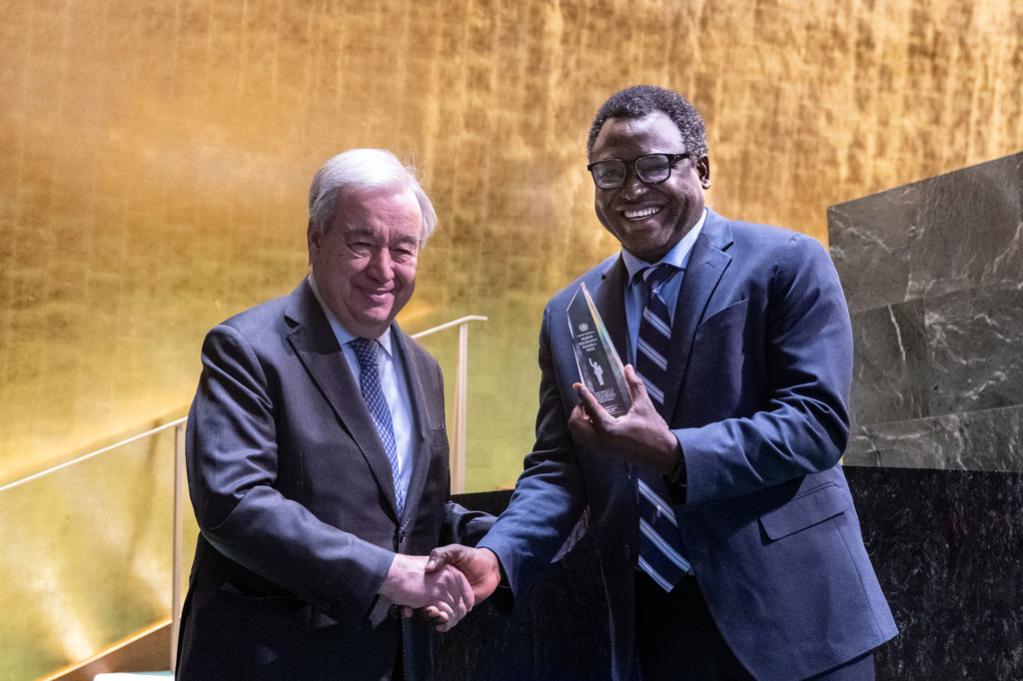
Press Release
15 February 2022
Kenya’s Adolescents the Winners as United Nations Joint SDG Fund Doubles its Portfolio to $114 Million in Catalytic Impact Investments
Selected from a global pool of submissions from over 100 countries, the proposals submitted by Kenya, Madagascar, North Macedonia, Suriname, and Zimbabwe emerged as the strongest, most impactful, and investment-ready to take public.
The investments constitute an ambitious and concerted response by the UN to the challenges of our generation: from health in a world still plagued by the COVID-19 pandemic to youth empowerment to climate change. Under the leadership of UN Resident Coordinators, implementation of these programmes will fuel the UN footprint in the five nations, ushering in a new generation of collaborative action across the UN, Governments, civil society, and private sector investors.
According to Dr. Stephen Jackson, the UN Resident Coordinator in Kenya,
“Vulnerable adolescent girls are amongst those at most risk of being left behind anywhere in the world. Our programme on Adolescent Sexual Reproductive Health will help Kenya reach vulnerable adolescent girls with Sexual and Reproductive Health (SRH) and HIV services to achieve gender equality and women’s and girls’ empowerment, reaching the furthest behind first. We’ll be helping Kenya blend public and private investment to push forward work in an area as delicate and sensitive as it is crucial to advancing Kenya’s youth”.
This announcement comes less than one year after the Fund launched its first investment of US $41 million in four transformative programmes in Fiji, Indonesia, Malawi, and Uruguay. In 2021, a US $17.9 million programme in Papua New Guinea was added, and with the addition of these five new programmes, the Joint SDG Fund’s Catalytic Investment portfolio will grow to US $114 million. The portfolio is expected to leverage US $5 billion toward the SDGs across the 10 programmatic countries.
In partnership with development banks and local financial institutions, Kenya’s newly created programme will support the scale up of the world’s first Adolescent Sexual and Reproductive Health (ASRH) development impact bond in Kenya that promises to not only transform adolescent health outcomes in Kenya but also open up endless opportunities for private and public investment, in public health.
Recognizing the immense support in the implementation of the UN joint programme initiatives, the JSDGF is exceedingly grateful for the level of cooperation from the dynamic inter-agency team in Kenya comprising of the SDG Partnership Platform Kenya at UNRCO, UNFPA, WHO, UNAIDS,CIFF, Triggerise and KOIS, as well as the Government of Kenya through the Ministry of Health, Council of Governors, participating county governments.
The Fund also marks its sincere appreciation for the contributions from the European Union and Governments of Denmark, Germany, Ireland, Luxembourg, Monaco, Kingdom of Netherlands, Norway, Portugal, Republic of Korea, Spain, Sweden, Swiss Agency for Development and Cooperation and our private sector funding partners, this milestone marks a transformative movement towards achieving the SDGs by 2030.
(United Nations Capital Development Fund, United Nations Development Programme, United Nations Children's Fund, United Nations Population Fund, International Labour Organization, World Food Programme, Food and Agriculture Organization, International Organization for Migration, United Nations Economic and Social Commission for Asia and the Pacific, International Fund for Agricultural Development, UNAIDS, United Nations Economic Commission for Europe, United Nations Environment Programme, United Nations Educational, Scientific and Cultural Organization, United Nations High Commissioner for Refugees, United Nations Industrial Development Organization, UN Women, World Health Organization and World Meteorological Organization.)
About: The UN Joint SDG Fund is a multi-partner trust fund established by the United Nations General Assembly. The Fund supports UN member states by de-risking investments that drive financing solutions to accelerate achievement of the Sustainable Development Goals (SDGs). Our goal is to disburse US$ 1 billion in grants annually in the race to 2030. All programmes share one critical element: their ability to leverage multi-million-dollar grants from the Joint SDG Fund into billions for sustainable development. Learn more: https://www.jointsdgfund.org/
1 of 5
Press Release
15 July 2021
FAO and Kenyan Government sign action plan to mitigate drought in ASALs Counties
15/07/2021 Nairobi - Kenya: The Food and Agriculture Organization of the United Nations (FAO) and the Ministry of Devolution and the Arid and Semi-Arid Lands (ASALs) today signed the Anticipatory Action and Response Plan for Pastoral and Agropastoral Communities in ASAL Counties of Samburu, Isiolo, Turkana, Garissa, Marsabit, Mandera, Wajir and Tana River.
This is in response to drought alert sent in June 2021 where 12 of the 23 ASAL counties were in the alert drought phase, while 16 reported a declining trend. This is an abnormal occurrence at the immediate end of the season.
‘Livelihood conditions have declined as a result of reduced access to pasture even as 56% of the ASAL counties reported increased trekking distances to water sources for livestock and domestic use. This is expected to get worse in the coming months hence the need for urgent anticipatory action,’ said Carla Mucavi - the FAOR Representative to Kenya during the signing.
‘The Government welcomes the support and collaboration of partners such as FAO in addressing this situation. This call for anticipatory action will go a long way in building the resilience of the communities in the affected Counties. Urgent action and a coordinated response is needed from donors and other concerned stakeholders before the situation deteriorates further,’ said the Cabinet Secretary for Ministry of Devolution and the Arid and Semi-Arid Lands (ASALs) Hon. Eugene Wamalwa.
The ASAL situation since 2020
The 2020 Short Rains Assessment established that the season had performed poorly. As of February 2021, 1.4 million people in ASAL counties were already experiencing acute food insecurity. This was aggravated by other factors including the COVID-19 pandemic, the desert locust invasion, food commodity price spikes, and livestock diseases.
Since then, the long rains in March-May 2021 have also under-performed. The onset of the season was late, the amount of rainfall was below normal in most ASAL counties, and its distribution in both space and time was poor.
Current drought indicators
An estimated two million people in ASAL counties are now in need of assistance. This figure is likely to rise as the situation worsens. There is a severe deficit of vegetation in Isiolo county and in Lagdera sub-county of Garissa, while the rest of Garissa and Kilifi, Marsabit, Tana River, and Wajir counties report a moderate vegetation deficit.
The proportion of children at risk of malnutrition is already above average in seven ASAL counties (Embu, Taita Taveta, Makueni, Narok, Kjiado, Meru, Nyeri). In addition to that, families are now forced to cover longer distances to access water for domestic and livestock use as water sources have dried up.
Resources needed for drought mitigation
Kenya’s drought response plan requires a total of Kshs. 9.4 billion for the period July – November 2021: Kshs. 5.8 billion for food and safety net support and Kshs. 3.6 billion for non-food interventions.
FAO is seeking a total of USD 15,007,460 (Ksh 1,500,746,000 billion) to cushion livestock assets and vulnerable pastoral households against the adverse effects of the drought, to support water interventions for increased access to water for Livestock and domestic used to enhance access to food and nutrition. This includes basic needs by farming households and to strengthen the institutional and technical capacity of National Drought Management Authority (NDMA) for effective implementation of the early warning mechanism.
1 of 5
Press Release
06 May 2021
Statement from the Executive Director of UNAIDS, Winnie Byanyima on the decision by the United States of America to support the TRIPS waiver for COVID-19 vaccines
5 May 2021 I applaud the announcement from United States Trade Representative Katherine Tai supporting the waiving of intellectual property protections for COVID-19 vaccines.
This is the kind of global leadership the world desperately needs as we witness horrific scenes in countries like India, where only nine in 100 people have been vaccinated. To date, more than 1.1 billion doses of vaccines have been administered globally, but more than 80% of those have been administered in high- and upper-middle-income countries, while just 0.3% have been administered in low-income countries.
We are in a race to vaccinate the majority of the world’s population to curb death tolls and before more potent variants of COVID-19 emerge, rendering current vaccines ineffective. The faster we can scale up global vaccine supply, the faster we can contain the virus and the less chance we will face a day when variants prove resistant to existing vaccines. As the United Nations Secretary-General, Antonio Guterres has said “no one is safe until everyone is safe”.
The TRIPS waiver would enable the sharing of technologies, data, know-how, patents and other intellectual property rights across the world. The announcement of the US administration sends a powerful signal to the rest of the G7 and to the
European Union to also support the World Trade Organization TRIPS Waiver and inspire other countries to take a powerful stand in favour of people before profits. This remarkable position from the US government is a fundamental step towards a People’s Vaccine.
To ensure everyone, everywhere has access to a lifesaving vaccine, we also need to see a pooling of technology through the World Health Organization’s COVID-19 Technology Access Pool, as well as financing to help build a network of vaccine manufacturing in developing countries. These three actions can together build a sustainable system to vaccinate the world, reach the needed herd immunity and open the paths to make the world best prepared for future pandemics.
As we have learned from 40 years of fighting AIDS, equitable access to medical technologies is critical both for saving lives and for decreasing the impact of infectious diseases on people, communities and nations.
We are grateful to President Biden and his Administration for the generous humanitarian pledges made on COVID-19 and for today’s announcement.
UNAIDS
The Joint United Nations Programme on HIV/AIDS (UNAIDS) leads and inspires the world to achieve its shared vision of zero new HIV infections, zero discrimination and zero AIDS-related deaths. UNAIDS unites the efforts of 11 UN organizations—UNHCR, UNICEF, WFP, UNDP, UNFPA, UNODC, UN Women, ILO, UNESCO, WHO and the World Bank—and works closely with global and national partners towards ending the AIDS epidemic by 2030 as part of the Sustainable Development Goals. Learn more at unaids.org and connect with us on Facebook, Twitter, Instagram and YouTube
1 of 5
Press Release
29 April 2021
Joint statement by the Government of Kenya and the United Nations High Commissioner for Refugees: Dadaab and Kakuma Refugee Camps Roadmap
President Uhuru Kenyatta met today with the UN High Commissioner for Refugees Filippo Grandi in Nairobi to discuss issues surrounding refugees and asylum seekers in the region, as well as receive a briefing on the status of Kakuma and Dadaab refugees camps, following the UN High Commissioner for Refugees’ meetings with Cabinet Secretaries Dr. Fred Matiang’i and Amb. Raychelle Omamo.
This meeting comes in the wake of the Government’s communicated intention to work toward the closure of the refugee camps in Kenya. A joint team comprising officials from the Government and the UN agency will therefore be formed to finalize and implement a roadmap on the next steps towards a humane management of refugees in both camps.
The roadmap, which was presented to the Government of Kenya in the beginning of April, includes voluntary return for refugees in safety and dignity, departures to third countries under various arrangements, and alternative stay options in Kenya for certain refugees from East African Community (EAC) countries.
“We are serious about completing the repatriation programme which we started in 2016, in full view of our international obligations and our domestic responsibility. We therefore reiterate our earlier position to close both Dadaab and Kakuma camps by 30 June, 2022,” said Cabinet Secretary Fred Matiang’i.
The Government of Kenya and UNHCR agree that refugee camps are not a long-term solution to forced displacement and are committed to working together to find alternative solutions that are in line with the responsibility sharing principles and goals of the Global Compact on Refugees (GCR).
“I believe that the Government and people of Kenya will continue to show their generous hospitality towards refugees as they have done for nearly three decades, while we carry on discussions on a strategy to find the most durable, appropriate and rights-based solutions for refugees and asylum-seekers residing in the refugee camps in Dadaab and Kakuma,” said the UN High Commissioner.
“Closure of the camps must be seen as an aspiration. We are not chasing people away, but a camp is not a permanent thing. It is a place of limbo. No one should live in a place of uncertainty or indignity generation after generation. What we are now working on is how to achieve this cooperatively which is in line with Global Compact on Refugees,” said Foreign Affairs Cabinet Secretary Amb. Raychelle Omamo.
High Commissioner Grandi welcomed the government’s continued commitment to the GCR during this process. “I am reassured by the government’s assurances that they will continue to provide protection and services for asylum-seekers and refugees in Kenya while various solutions are pursued.”
Among the precursory activities contained in the government’s roadmap is a unanimous resolution that was recently endorsed by ambassadors and representatives from East African countries which have a mutual diplomatic relationship with Kenya when they met a delegation led by Interior Cabinet Secretary, Dr. Fred Matiang’i.
“Refugees from East African countries will be given the option of being issued a work permit for free so that they can integrate into Kenyan communities or return to their country of origin,’’ said Dr. Matiang’i.
Digital verification of Kenyans currently also registered as refugees is set to begin in due course. This will inform the issuance of appropriate documentation to Kenyan citizens and ensure their removal from the refugee database.
Kenya has shouldered the burden of sheltering refugees for almost three decades, and the swelling camps have overstretched their capacity to host populations. The government has also expressed grave concerns over the security of both Kenyans and refugees at the camp.
There are currently 433,765 refugees living in Dadaab and Kakuma camps.
1 of 5
Press Release
05 February 2021
Country Level Food Systems Dialogues in Kenya
Building healthier, more sustainable, and equitable food systems are recognized as a powerful and essential requirement to deliver on all SDGs. The term “food system” refers to the constellation of activities involved in producing, processing, transporting, and consuming food. Food systems touch every aspect of human existence.
The health of our food systems profoundly affects the health of our bodies, as well as the health of our environment, our economies, and our cultures. When they function well, food systems have the power to bring us together as families, communities, and nations. But too many of the world’s food systems are fragile, unexamined, and vulnerable to collapse, as millions of people around the globe experienced first-hand during the COVID-19 crisis. When our food systems fail, the resulting disorder threatens our education, health and economy, as well as human rights, peace and security. As in so many cases, those who are already poor or marginalized are the most vulnerable. Some countries and regions face unique circumstances, which can increase their vulnerability.
In 2021, UN Secretary-General António Guterres will convene a Food Systems Summit as part of the Decade of Action to achieve the Sustainable Development Goals (SDGs) by 2030. With only 10 years remaining, many of the 17 SDGs remain far out of reach. In many cases, unsafe or unsustainable food systems are part of the problem. The UN Food Systems Summit will serve as a turning point in the world’s journey to achieve all the SDGs. We know what we need to do to get back on track: Scientists agree that transforming our food systems is among the most powerful ways to change course and realize the vision of the 2030 Agenda. Rebuilding the food systems of the world will also enable us to answer the UN Secretary-General’s call to “build back better” from COVID-19. We are all part of the food system, and so we all must come together to bring about the transformation that the world needs
The need is urgent, and our ambition is high. The UN Food Systems Summit will launch bold new actions, solutions and strategies to deliver progress on all 17 SDGs, each of which relies to some degree on healthier, more sustainable and equitable food systems.
The Summit will awaken the world to the fact that we all must work together to transform the way the world produces, consumes and thinks about food. “We believe in a world where healthy, sustainable and inclusive food systems allow people and planet to thrive. It is a world without poverty or hunger, a world of inclusive growth, environmental sustainability and social justice. It is a resilient world where no one is left behind.” Said AGNES KALIBATA, Special Envoy for the UN Food Systems Summit
1 of 5
Latest Resources
1 / 11
1 / 11






















